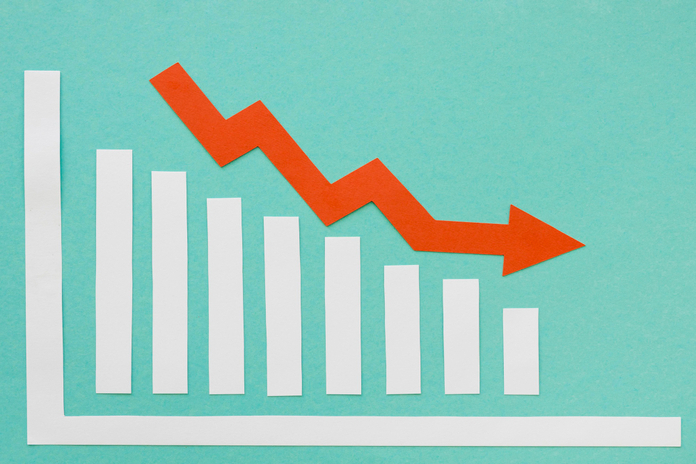Stocks took a sharp downturn today, with major indices such as the S&P 500 Index (S&P: $SPX) and Nasdaq 100 (NASDAQ: QQQ) sinking to new lows. The market’s decline comes in the wake of President Trump’s latest tariff announcement, which has sent ripples through global markets. The new trade policies, which impose higher reciprocal tariffs on numerous countries, have created a risk-off environment, sending stock prices plummeting.
How Tariffs Impact on Stocks and Investor Sentiment
The S&P 500 Index ($SPX) dropped by -3.58%, with the Nasdaq 100 ($QQQ) following suit with a -3.90% decrease. As investors reacted to the latest tariff news, the Dow Jones Industrial Average ($DOWI) also saw a decline of -3.24%. The announcement that the U.S. will impose new tariffs on over 60 countries has escalated fears of an economic slowdown, leading to market-wide sell-offs.
While the tariffs will affect various sectors differently, stocks in industries such as technology, retail, and consumer goods are particularly vulnerable. Companies like Apple (NASDAQ: AAPL), Amazon (NASDAQ: AMZN), and Tesla (NASDAQ: TSLA) have been heavily impacted, with shares of these companies falling significantly in response to the new trade policies.
The Tariff Details and Its Economic Repercussions
President Trump outlined that the U.S. will impose at least a 10% tariff on all countries, with some nations facing even higher rates. Notably, China will see a 34% reciprocal tariff, while the EU faces a 20% reciprocal tariff, pushing the total tariff burden on the EU to 39%. Countries like Canada and Mexico are exempt from the new tariffs, but will continue to face the previously announced 25% tariffs.
This sharp increase in tariffs is a response to concerns over the trade deficit and is seen as a way to push other nations to renegotiate trade deals with the U.S. However, the move has raised fears of inflation, decreased consumer spending, and disrupted global supply chains, all of which are contributing to the declining stock prices.
Global Markets React to the Tariff Uncertainty
Overseas, markets mirrored the U.S. stock market’s negative response to the tariff announcements. The Euro Stoxx 50 dropped -3.14%, while the Nikkei 225 in Japan fell by -2.77%. The Shanghai Composite Index in China also posted a -0.24% decline. These global losses reflect the widespread uncertainty generated by the U.S.’s aggressive trade policies, which are weighing heavily on investor sentiment worldwide.
Impact on Specific Sectors and Stocks
The tariff announcement has significantly affected technology and consumer-driven sectors, particularly companies with large international operations. Apple (NASDAQ: AAPL) is down over 8% due to its heavy exposure to foreign markets. Amazon (NASDAQ: AMZN) and Meta Platforms (NASDAQ: META) have seen declines of more than 6%, and chip makers like Micron Technology (NASDAQ: MU) and Nvidia (NASDAQ: NVDA) are also down by more than 7%.
Consumer-focused stocks are also under pressure, especially those that import goods from Asia. Retail giants such as Nike (NYSE: NKE), Lululemon Athletica (NASDAQ: LULU), and Deckers Outdoors (NYSE: DECK) have all experienced significant losses, with Deckers seeing the largest drop of -14%. The tariffs could result in higher costs for companies that rely on imported goods, which may, in turn, raise prices for consumers and curb discretionary spending.
Safe-Haven Assets Gaining as Tariffs Impact on Stocks
In contrast to the broader market decline, safer assets such as government bonds are seeing an influx of investment. U.S. Treasury yields are falling, with the 10-year Treasury bond yield dropping to a 5-1/2 month low. As stock markets falter, investors are seeking refuge in government debt, which is benefiting from the fear-driven shift away from equities.
Additionally, the sell-off in global equities has helped push the prices of defensive stocks, particularly those in the food and beverage sector, higher. Companies like Coca-Cola (NYSE: KO) and Mondelez International (NASDAQ: MDLZ) are among the few to see positive movement as investors look for stability in times of uncertainty.
Outlook: Will the Tariffs Affect the Long-Term Stock Market?
The full impact of the new tariffs on stocks remains to be seen. While immediate reactions have been negative, especially for companies that rely on international trade, the long-term effects will depend on how global trade relationships evolve in response to these new policies. Investors will be closely watching any developments regarding negotiations or potential changes to the tariff structure in the coming weeks.
As market volatility continues, the focus will remain on the U.S. labor market, inflation data, and potential shifts in the Federal Reserve’s interest rate policy. For now, investors are bracing for further impact as President Trump’s tariffs weigh on stocks and global market sentiment.
Featured Image: Freepik







